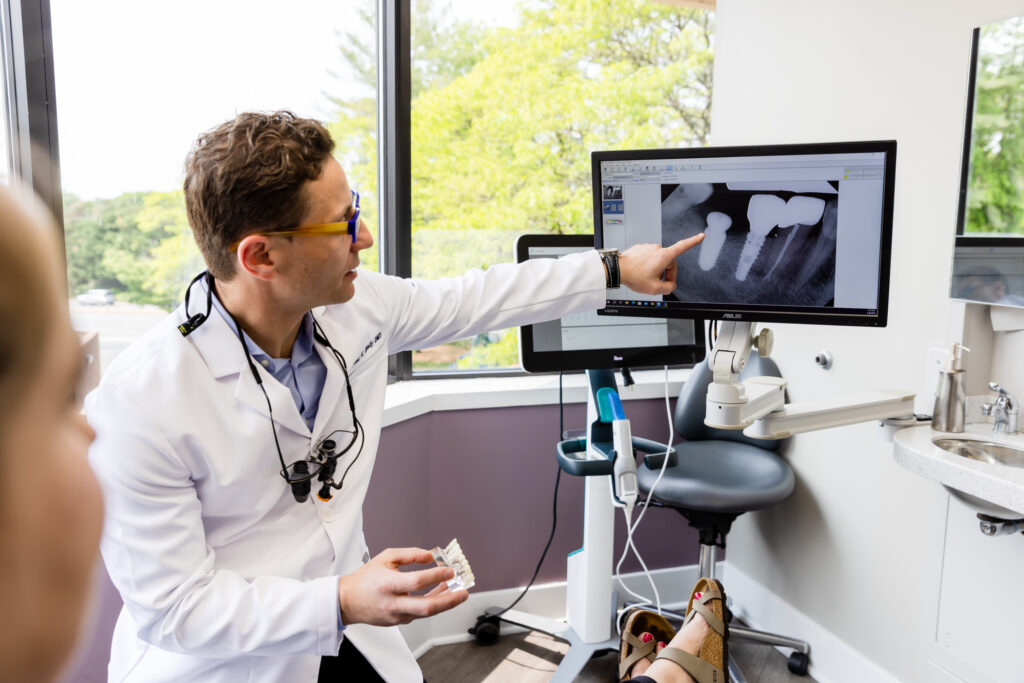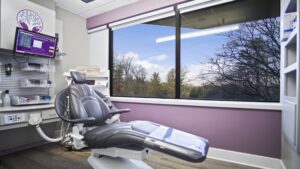Our TMJ disorder specialist will have you come in for a consult where we’ll discuss your symptoms. We will then take a good look at your jaw and bite, assess the range of motion in your jaw, and listen for clicks or pops as you open and close your mouth. We typically order dental X-rays to get a better look at the bones and soft tissues around your jaw to confirm the diagnosis and rule out other conditions.
TMJ Treatment in Fairfax, VA
Visit Our TMJ Disorder Specialist for Effective Jaw Pain Relief
We know that walking around in pain can disrupt your daily activities and lower your quality of life.
Disorders of the temporomandibular joint (TMJ) are well-known for causing sufferers chronic jaw pain, headaches, and even difficulty chewing. The cause varies from person to person with the most common reasons being anxiety disorders, injury, certain medications or misalignment of the jaw bone. Our dentists recognise the need for non-invasive treatments for this common disorder which is why we are excited to offer Botox and oral appliance therapy to bring you much-needed relief.
Common TMJ Symptoms
The earlier you are able to identify TMJ symptoms the sooner we can intervene with non-invasive treatment options.
Jaw Pain
Pain that is felt directly in the jaw joint is one of the most immediate and noticeable signs of a TMJ disorder. The pain is usually bothersome while eating or speaking, but as the disorder progresses the pain can become a constant ache.
Clicking or Popping Sounds
If you hear a clicking or popping noise when you move your jaw this could be a sign of TMJ. These sounds may or may not be accompanied by pain but indicate that the joint is not functioning correctly.
Difficulty or Pain While Chewing
TMJ disorders can make chewing difficult and uncomfortable. The pain can range from mild to so severe it restricts what you can eat.
Lockjaw
TMJ disorders can lead to the jaw being stuck in an open or closed position. This locking of the jaw can be temporary or might require medical intervention to relieve.
Ear Pain and Headaches
Many people with TMJ disorders experience ear pain that might be mistaken for an ear infection. The disorder can also cause tension headaches which are typically felt around the temple area.
Frequently Asked Questions
Most of our patients report relief from TMJ and bruxism symptoms for three to six months. Your dentist in Oakton will work with you to come up with a maintainence schedule so we can keep your symptoms under control permanently.
Botox injections are generally very safe. Common side effects include minor swelling, bruising, or redness at the injection sites. In rare cases, Botox might lead to muscle weakness, or there may be unintended effects on nearby muscles, which can cause issues such as a crooked smile or drooling. These effects are temporary and can be corrected. It’s important to reiterate adverse events are incredibly rare.
Yes, you can head back to work right after your Botox appointment. The procedure is minimally invasive and does not require any downtime. Some patients might experience slight bruising or discomfort around the injection sites, but this shouldn’t interfere with daily activities. We recommend avoiding strenuous physical activity for 24 hours to ensure the best results from the treatment.
Oral appliance therapy involves wearing a custom-fitted device similar to a mouthguard while you sleep. It can help prevent teeth grinding and clenching associated with bruxism and TMJ disorders. The appliance takes pressure off the jaw joints and reduces wear and tear on the teeth. They can also help reduce muscle tension in the face and neck by positioning the jaw slightly forward.

Get Effective Jaw Pain Relief Today!
Trust our TMJ disorder specialist to give you lasting relief from teeth grinding, jaw pain, and headaches to get back to living life to the fullest.







